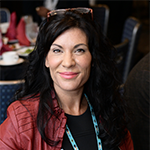
- This event has passed.
WORKSHOP – Integrated Capital for Self-Determination and Resilience in Regenerative Agriculture
May 11, 2021 @ 9:00 am – 10:30 am PDT
Presented by Swift Foundation and Guidelight Strategies
How can we fill the critical gaps in financing the transition to regenerative agriculture that supports the economic self-determination of Indigenous, Black, and other communities of color?
Now is the time to ensure that the “regenerative” capital structures we develop center community economic and Indigenous Peoples’ rights and self-determination at their core. How do we guarantee that these funds explicitly address equity and structural racism that Indigenous Peoples, farmers of color, and other marginalized groups face, especially regarding land access; and ensure that regenerative agriculture investments do not only strengthen white farmers, who already own 98% of farmland in the US?
We will hear from speakers working on integrated capital structures across our landscapes, and explore opportunities to create new financial entities necessary to support the growing needs of these sectors, ensure equity, and ensure that access to patient, blended capital is equitable and available through creative strategies such as blended finance, loan loss revenues, CDFIs and loan funds.
Session goals:
- Set context of current financial landscape and challenges and opportunities, centering economic self-determination and food sovereignty as integral to regenerative agriculture and Indigenous agriculture.
- Inspire other philanthropic organizations and institutions with financial power to move more money towards regenerative agriculture led by BIPOC communities, such as supporting loan loss reserves with grants alongside investments.
- Encourage more collaboration, conversation, and investment by funders and investors into innovative BIPOC-centered regenerative agriculture opportunities.
Speakers
Suzanne Benally – Moderator, Swift Foundation; NM

Suzanne Benally is Navajo and Santa Clara Tewa. She grew up in the community of Shiprock, New Mexico on the Navajo Nation. Her maternal clan is Kinlichii̒nii (Red House People) and she was born for Naashaashi (Bear People Clan). Suzanne has worked in higher education and the non-profit sector for 35 years. Most recently, Suzanne served as the Executive Director of Cultural Survival, an international Indigenous rights advocacy organization that advocates for Indigenous Peoples’ rights, self-determination, land, language, culture, and political resilience. Formerly, she served as the Associate Vice President for Academic Affairs at Naropa University, and was a core faculty member and previous chair of the environmental studies department. Her extensive experience spans positions devoted to social justice, diversity, and equity. Suzanne is currently co-chair of the International Funders for Indigenous Peoples and a Trustee of the Naropa University Board of Trustees. She is a cohort member of the Rothko Chapel’s Spirituality and Social Justice initiative to further contemporary understandings about spiritualty and social justice. Deeply committed to social, environmental and climate justice, her work, passion, and interests center on relationships and interconnectedness between land, spirituality, culture, and people as reflected in narratives and stories past and present.
Anthony Chang, Kitchen Table Advisors; CA

As the son of Asian immigrant small business owners, Anthony has been drawn to food and the people behind our food throughout his life, driven by values of social justice and ecological responsibility. From learning how to make dumplings from his dad as a kid and working part-time jobs in a cafe and organic vegetable basket home delivery service, to building relationships with farmers like Marsha and Modesto of Oya Organics at the Mountain View farmers’ market, he has long respected the incredibly hard-working people who grow, produce, cook, serve and share delicious food. Anthony has spent 20+ years working in economic opportunity for communities of color, in particular immigrant communities. Much of his experience has centered around exploring different ways to channel capital to communities of color and immigrant small business owners. He learned the benefits and drawbacks of CDFI lending to small businesses through 15+ years at Opportunity Fund and California FarmLink. Serving on the boards of Common Future (current) and RSF Social Finance (past), he has contributed to uplifting the bridges and financial intermediaries between wealth holders and community wealth builders and/or social enterprises. Anthony has most recently partnered on experimenting with new models of BIPOC-led and governed resources through projects like the collaborative CA BIPOC Farmer/Land Steward Relief Fund. His current role at Kitchen Table Advisors focuses on institutional level change which shifts capital in ways that fuel the economic viability and self-determination of a multi-racial next generation of sustainable small farms and ranches.
Chrystel Cornelius, Oweesta Corporation; CO

Chrystel Cornelius is the President & CEO of the Oweesta Corporation, a national Native CDFI intermediary predominantly serving Native communities across the United States, Alaska, and Hawaii. Ms. Cornelius has worked with Native communities for most of her professional career, with more than 23 years of experience working in the Native economic development field. She is an enrolled member of the Oneida Nation of Wisconsin and a member of the Turtle Mountain Band of Chippewa Indians located in North Dakota. Ms. Cornelius has dedicated her career to capitalizing Native communities upholding tribal sovereignty and self-determination measures through the issuance of capital and organizational capacity building efforts. Chrystel Cornelius is a founding steering committee member and previously held the position as the Board Secretary for the Native CDFI Network (NCN). Ms. Cornelius is also a former board member of Opportunity Finance Network (OFN), is a current board member of the Community Reinvestment Fund (CRF) and holds the position of Board Chair for the Red Feather Development Group. Ms. Chrystel Cornelius attained a bachelor’s degree in Business Management from the University of Mary in Bismarck, North Dakota.
Skya Ducheneaux, Akiptan Fund; SD

Skya Ducheneaux, an enrolled member of the Cheyenne River Sioux Tribe, spent the first 18 years of her life on a cattle ranch on the CRST Reservation in South Dakota and has a Bachelor’s and Master’s Degree in Business Administration. Previously, Skya worked for the Intertribal Agriculture Council; first as an intern and most recently as a Project Coordinator, where she was introduced to the Native Community Development Financial Institution world (Native CDFI). Skya worked diligently to create the first national Native CDFI dedicated to Indian agriculture, Akiptan, which launched in 2019. Today, she is the Executive Director of Akiptan and remains connected to agriculture, just from the other side of the table.